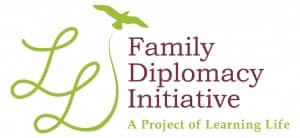(c) Paul Lachelier 2019
This letter is meant for the lower-income parents and guardians Learning Life work with in Washington, DC, but is posted publicly to help make clear why Learning Life engages lower-income families.
Dear parents and guardians,
I am writing to you to explain why Learning Life wants to engage your family in world learning. In explaining, I’m going to focus on four terms: globalization, segregation, global citizenship, and family diplomacy.
Some of you may wonder why we don’t instead focus on basics, like math, science or reading. We focus on world learning because schools focus more on math, science and reading, and because our world is globalizing. Globalization means that our world is getting smaller, that improvements in transportation and communication technologies are making it faster and easier for people, information, goods and services to move from one country to another. This is why the juice we drink may be made of fruit coming from Florida as well as Mexico, Brazil and India; why we eat Mexican burritos and Chinese fried rice, not just burgers and fries; why our cell phones are made from minerals mined in Canada, Turkey, Russia, Afghanistan and the Democratic Republic of Congo; and why cars made in the USA have parts coming from all over the world. Our lives are richer, and we have many more things to buy pretty cheaply because of globalization. At the same time, globalization means that issues like joblessness, climate change (extreme weather, including more frequent and powerful hurricanes, warmer winters, hotter summers, etc.), terrorism and disease increasingly affect more than one country.
While our world is globalizing, it is also deeply segregated by wealth and race. Segregation means that all around the Earth, rich and poor, and whiter and darker-skinned people often live in separate neighborhoods, even when they live in the same towns and cities. This is very much the case in Washington, DC. (For a stark look at the differences between the richest and poorest neighborhoods or wards of Washington, DC, click here.) Segregation is bad because it shuts poorer people out of many opportunities they would have if their neighborhoods had more of a mix of people of different races and wealth levels, and more of a common spirit of sharing rather than hoarding resources (money, jobs, good schools, decent homes, etc.). So, we live in a strange world because globalization is connecting people, but segregation keeps us apart, not just locally but also globally. We affect each other, but we usually don’t see how we affect each other, for better or worse.
That’s why learning about and connecting with the world is so important. The more we learn about the world, the better we understand how we are all connected, how we affect each other, and what we can do to improve our world, especially for those people that have less. The more we connect with people around the world, the more familiar and less strange they become, and the more we may come to trust and help each other. That’s where global citizenship comes in. We’re used to thinking of citizenship as “I am a citizen of the USA,” with all the rights (to vote, run for public office, religion, public schooling, etc.), and responsibilities (paying taxes, jury duty, military service in times of war, etc.) that comes with. But because of globalization we are also more and more citizens of the world. Being a global citizen means caring about people outside the USA not only because what people do outside the USA affects us as Americans, but because we are all human beings who think, feel, laugh, love and cry. Being a global citizen means not only enjoying the fruits of globalization — the cheaper and more varied food, cell phones, cars, and other goods we get from the world — but helping to make our world a better place for everyone by together tackling problems like climate change, poverty, disease, terrorism and war. Our world is a complicated place, so it can easily seem too difficult to understand, let alone address its problems. However, the problems aren’t going to go away if we just ignore them.
Moreover, there is such an exciting, beautiful world out there to explore, and so many different, interesting people to meet! That’s why Learning Life is developing family diplomacy. Diplomacy — the management of relationships between countries — has for most of human history been controlled by rich and powerful people, but globalization, especially the internet and cell phones, is allowing ordinary people like you and me to connect and cooperate with ordinary people in other countries. Family diplomacy in part means connecting families in different countries so that they can learn from each other about the world: about our families, cultures, communities and countries, about our joys, sorrows, fears and triumphs. Family diplomacy can help make the world seem less strange and complicated because most people have a family and value it. Family diplomacy may also help make the world a more caring place because families, at their best, are about loving and caring for each other.
So, if globalization connects us all in ways we often don’t see, and segregation pulls us apart by wealth and race, global citizenship can open our eyes, and family diplomacy can connect our hearts. Perhaps best of all, you don’t have to be rich to engage in global citizenship and family diplomacy. All you need is an internet-connected cell phone or laptop, and some caring volunteers to guide you. That’s where Learning Life comes in. We look forward to helping your family connect with the world!
Paul Lachelier, Ph.D.
Founder & Director, Learning Life
